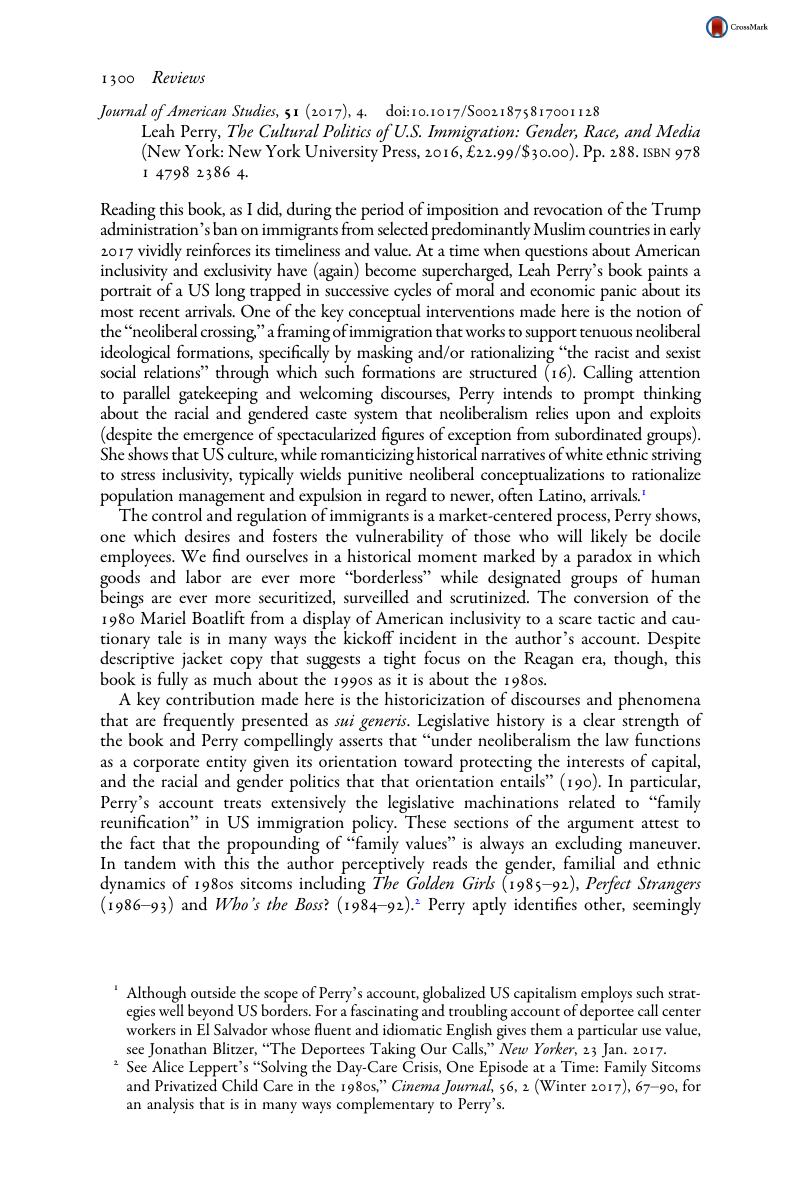No CrossRef data available.
Article contents
Leah Perry , The Cultural Politics of U.S. Immigration: Gender, Race, and Media (New York: New York University Press, 2016, £22.99/$30.00). Pp. 288. isbn 978 1 4798 2386 4.
Review products
Published online by Cambridge University Press: 10 October 2017
Abstract

- Type
- Reviews
- Information
- Journal of American Studies , Volume 51 , Special Issue 4: Exploring the Global History of American Evangelicalism , November 2017 , pp. 1300 - 1301
- Copyright
- Copyright © Cambridge University Press and British Association for American Studies 2017
References
1 Although outside the scope of Perry's account, globalized US capitalism employs such strategies well beyond US borders. For a fascinating and troubling account of deportee call center workers in El Salvador whose fluent and idiomatic English gives them a particular use value, see Jonathan Blitzer, “The Deportees Taking Our Calls,” New Yorker, 23 Jan. 2017.
2 See Leppert's, Alice “Solving the Day-Care Crisis, One Episode at a Time: Family Sitcoms and Privatized Child Care in the 1980s,” Cinema Journal, 56, 2 (Winter 2017), 67–90 CrossRefGoogle Scholar, for an analysis that is in many ways complementary to Perry's.
3 See my discussion of the film (framed within a broader analysis of Marisa Tomei's fantasized Italianness) in Off-White Hollywood: American Culture and Ethnic Female Stardom (London: Routledge, 2001), 147–51Google Scholar.
4 Beltran, Mary, “The Hollywood Latina Body as Site of Social Struggle: Media Constructions of Stardom and Jennifer Lopez's ‘Cross-over Butt’,” Quarterly Review of Film and Video, 19, 1 (2002), 71–86 CrossRefGoogle Scholar; Negrón-Muntaner, Frances, “Jennifer's Butt,” in Gutmann, Matthew C., Rodríguez, Félix V. Matos, Stephen, Lynn and Zavella, Patricia, eds., Perspectives on Las Américas: A Reader in Culture, History, & Representation (Malden, MA: Wiley-Blackwell, 2003) 291–98Google Scholar; Molina-Guzman, Isabel, Dangerous Curves: Latina Bodies in the Media (New York: New York University Press, 2010)CrossRefGoogle Scholar.


